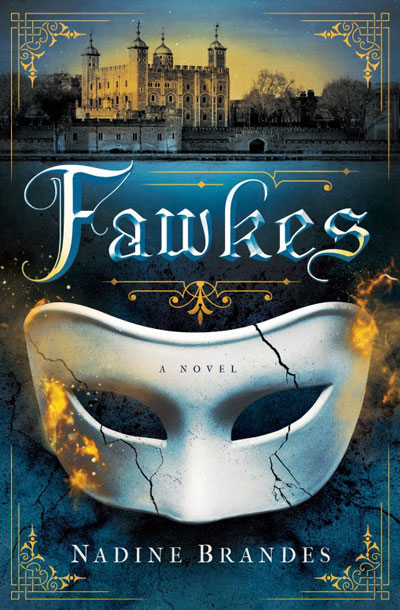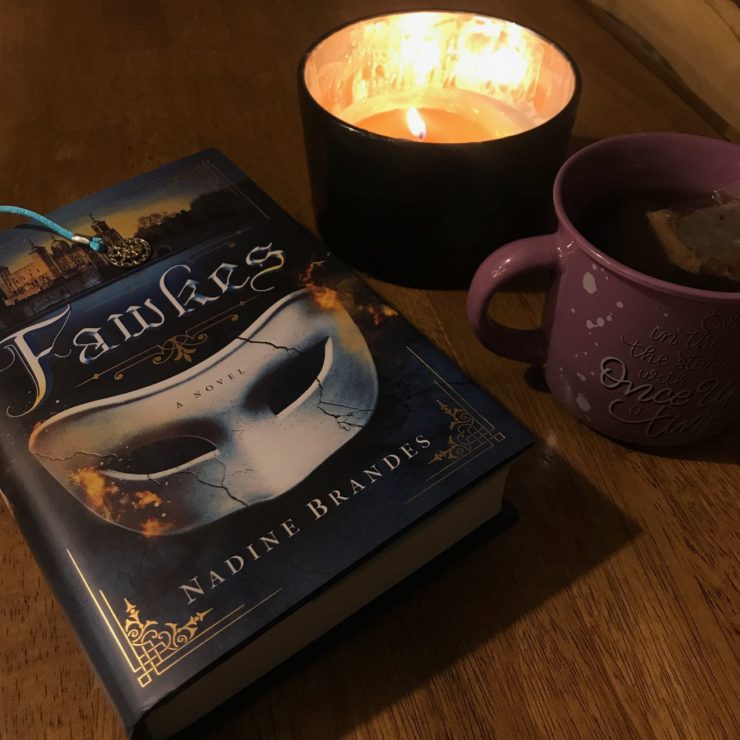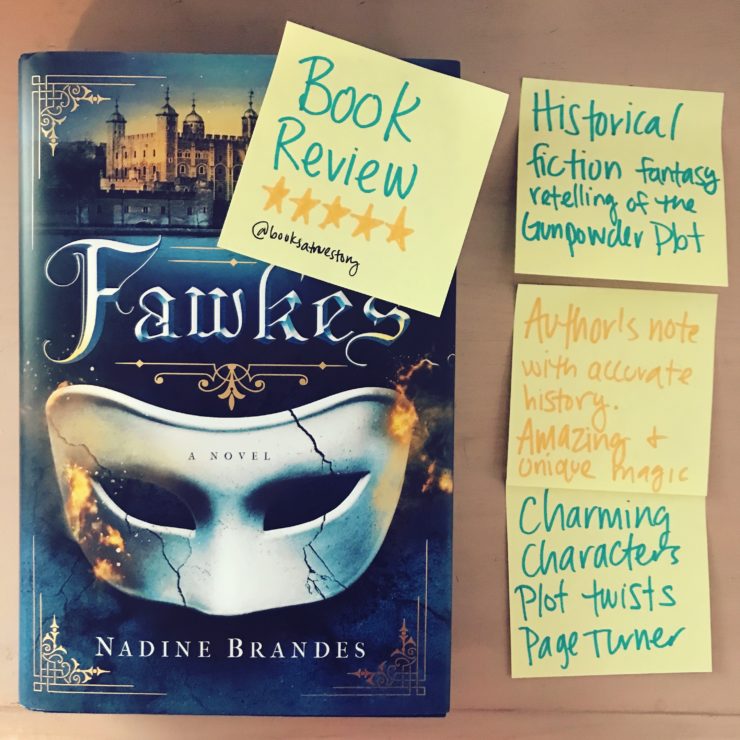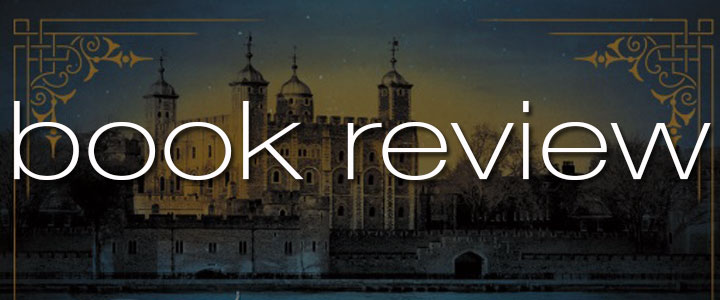
Fawkes
by Nadine Brandes
Published: July 10, 2018
Genres: Fantasy, Historical Fiction, Young Adult
Format: Hardcover (448 pages)
Source: Purchased
moreThomas Fawkes is turning to stone, and the only cure to the Stone Plague is to join his father’s plot to assassinate the king of England.
Silent wars leave the most carnage. The wars that are never declared, but are carried out in dark alleys with masks and hidden knives. Wars where color power a...
Fawkes starts out introducing us to Thomas who is slowly turning to stone on the day he needs to take an important test at St. Peter’s Color School which sounds just as amazing as Hogwarts. The school teaches about how to use the magical power of each color. They learn how to talk to a certain color and then they can control all the brown items, for example, by talking to that color using a mask. How cool is that?! I have never read such a unique magic system. I got this book in the July 2018 Unicorn Crate and the owner picked the theme Magic Systems to go with this book and it was perfect.

Not only does this book have the coolest magic system ever, it is also historical fiction about the Gunpowder Plot. I loved the author’s note at the end that clarifies what was accurate and what was stretched. I learned so much history just from reading this book. The magic is obviously a huge fictional part of the story, but the conflict between the Igniters and the Keepers in Fawkes very much followed the Protestant/Catholic conflict of this time period in 17th century England. The Igniters (Protestant) believed that you should be able to talk to more than one color and directly to white light (the source of all color magic). The Keepers (Catholic) thought that you should only talk to one color and not directly to white light. White light is actually a character in the story and is a snarky God-like figure. He was awesome.
The biggest conflict in the story comes from everyone blaming others for the stone plague. The Igniters think that the Keepers caused it by hiding white light from everyone because white light can’t be controlled like the other colors can. They believe Keepers just want control and power. Keepers think that Igniters caused the plague because they started speaking directly to white light. A rogue Keeper named Luther even started the Igniter movement. The story is told in such a nuanced and interesting way that I couldn’t even begin to guess who was right or how they would even work this out. There were so many cool plot twists that I couldn’t put this book down.

Thomas is so endearing. He’s defined by honor and strives to keep it but he’s not always perfect at it. He also desperately wants his color mask and he never stops seeking it. And obviously he would like to get rid of the plague that is slowly turning him to stone. I loved how well the author went into Thomas’ motivations. It made him a fascinating character to follow.
Fawkes is an honest discussion of feminism, racism, and religion. Well, sort of about religion. It mostly deals with the historical conflict of war over religions, but Thomas goes on a personal journey of faith, too, by deciding what he believed about color magic. My favorite quote in the book is Thomas’ reaction when someone is criticizing him for questioning the religion he was raised in:
“You’ve given me your truth. I have to find it for myself for it to become mine. And curiosity is the first step.”
-Nadine Brandes, Fawkes pg 196
Thomas learns about racism, too. He realizes that “my culture had affected my thinking without my consent. (pg 264).” And the conflict between the Igniters and Keepers was full of prejudice and killing on both sides.
I loved the romance between Emma and Thomas. Emma is a fierce character and no damsel in distress. They have a beautiful romance and the teach each other to be more tolerant. In the author’s note, Nadine Brandes mentions a movie that the character of Emma was inspired by and I highly recommend watching it! The movie is based on a real person, too.
I highlighted too many quotes about faith and tolerance and truth that I can’t share them all. But my favorite quote is probably this one.
“It be those who dream of the impossible who end up defying the very word.”
-Nadine Brandes, Fawkes pg 412
Book Review of Fawkes on a Post-it
I post reviews like this on Instagram. Be sure to follow me there!

Discussion Questions
**Warning: Might contain spoilers for the book
I saw these discussion questions in the back of the book and I wanted to share them in my review.
- Thomas felt incomplete because of his plague. Have you ever had an injury or an illness that made you feel that way?
- Thomas was caught between two sides–the Keepers who wanted to be free of oppression and the Igniters who wanted to be free to use color speech as they pleased. In the end, Thomas realized he had to find the truth for himself. What ways can you search for truth or seek the source of matters relevant to you today?
- When Thomas started figuring out his own stance on the war, he felt like he had to stay in the plot so as not to let everyone down. Do you ever find yourself being swayed by pressure from others?
- Some people–like Catesby–are very passionate about their cause. They are easy to follow and cheer for. What are some pros and cons of a persuasive personality?
- Emma treated Thomas as a regular man–acknowledging his difference and accepting him as he was. Her treatment of him taught him to respond the same way to her when she revealed herself to him. Is there someone in your life who is different or has a difference? How can you show them love as they are?
- Have you ever felt like you needed to hide your true self? Why?
- Sometimes we fear things we can’t control–like White Light. What do you think is a healthy approach to these fears?









 My name is Jessica. I love to read Young Adult and classic literature. I’ve been a book blogger for six years and I haven’t gotten tired of it yet. I’m a very curious reader. Writing about all the questions and thoughts I had while reading a book is the best hobby ever.
My name is Jessica. I love to read Young Adult and classic literature. I’ve been a book blogger for six years and I haven’t gotten tired of it yet. I’m a very curious reader. Writing about all the questions and thoughts I had while reading a book is the best hobby ever.
Leave a Reply